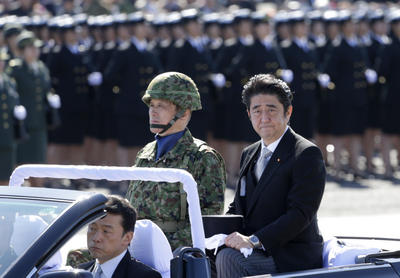Legally speaking, the Cabinet decision has no teeth on its own. The decision will only have an impact if it is implemented via subsequent revisions to the law by the Diet. Politically speaking, the situation is only going to become more difficult for Abe. The ruling Liberal Democratic Party’s (LDP) coalition partner New Komeito supported collective self-defence on the condition that the language included some restraints. But a schism is already developing between the Abe administration and New Komeito over their interpretation of the Cabinet decision.
Also, the Japan Restoration Party (JRP), who originally supported collective self-defence, is now backpedalling because their members have parted from former JRP co-leader Shintaro Ishihara and assorted right-wing groups. The party is to merge with the Unity Party led by Kenji Eda, who claims collective self-defence is unnecessary.
Neither is the upcoming schedule kind to Abe. Gubernatorial elections for Fukushima and Okinawa prefectures will be held in October and November. Voters in Fukushima, still hurting from the collapse of their local community, will create major resistance to the Abe administration.
Voters in Okinawa are against the construction of a replacement facility for the US Marine Corps Air Station in Futenma and are extremely sensitive to matters of war and peace. The debate over collective self-defence will inevitably have a major effect on upcoming elections, just as it did in the gubernatorial election in Shiga prefecture where the LDP-supported candidate lost in an upset.
Abe was forced to postpone the presentation of a bill relating to collective self-defence until next year, due to both resistance in the Diet and the plunge in poll ratings that followed the Cabinet’s collective self-defence decision. The Abe administration’s approval rating is trending downward, and all the recent polls are showing that it is less than 50 per cent. In a 19-20 July poll by the Sankei Shimbun, 35.3 per cent agreed with the move to reinterpret the Constitution while 56.0 per cent disagreed with it. A 25–27 July poll by Nikkei produced 36 per cent in favour and 48 per cent against the move to exercise collective self-defence.
But collective self-defence is hardly the only issue causing Abe trouble with the voters. Support for his economic policy is diminishing. Voters are divided on his overall foreign diplomacy and security policy. And, on issues like nuclear power, lowering the corporate tax and raising the consumption tax again, voters disapprove of his actions by large margins. That reduces the political capital he can spend on collective self-defence.
Why is there so little support for collective self-defence?
First, many Japanese people have a naïve outlook on security. Despite China’s rise as a military power and North Korea’s belligerent attitude, the roots of a pacifist mentality extend deep into the social psychology of post-World War II Japan.
Second, the nuclear disaster in Fukushima lifted the curtain on the malfeasance and lack of accountability of Japanese politicians and bureaucrats. Behind every dissenting voice is a general perception that the strict restraints against collective self-defence should not be loosened under such a system.
Third, the public is bewildered that the relatively alien concept of collective self-defence has been so suddenly thrust at them and has already become the subject of a Cabinet decision.
Fourth, opponents are sceptical about the ability of Japanese politicians and bureaucrats to manage ties with Japan’s allies, especially when interests diverge. Those against collective self-defence can use actual examples of Japan succumbing to the political and administrative whims of the US to make their counterarguments. For example, in the 2003 Iraq War Japan, unlike France and Germany, sent the SDF to Iraq. The opposition holds that the SDF provided only humanitarian support because of the restrictions against collective self-defence, but they wonder what would have happened if the restrictions had been lifted.
Some researchers believe the American stance (or lack thereof) on the Senkaku/Diaoyu islands dispute between Japan and China is proof that the US does what is convenient for the US. The current American position is that while the US–Japan Security Treaty applies to the defence of the Senkaku/Diaoyu islands because they are under the administrative control of Japan, the US does not concern itself with territorial sovereignty. This is an example of American political convenience. Before 1971, when Nixon visited China, the US maintainedthat Japan had sovereignty over the area. The more people realise these facts, the more they doubt Japan’s capacity to manage its allies, and the stronger the backlash becomes against collective self-defence.
Finally, the fact that Abe is behind collective self-defence is keeping it from being accepted. Japan would most likely exercise the right to collective self-defence in response to a crisis on the Korean Peninsula. Under such a scenario, the SDF could provide supplies, intercept suspicious vessels in surrounding ocean waters and provide other assistance, but the need for SDF vessels to enter South Korean territory to rescue Japanese people may arise.
Unfortunately, given the turbulent relationship that Tokyo currently has with Seoul, which has been exacerbated by actions such as Abe’s visits to the Yasukuni Shrine and denials regarding ‘comfort women’ during World War II, neither side can consider entering the territory of the other. This problematic relationship also precludes discussions that the US wants to have about trilateral security among the US, Japan and South Korea.
Given these difficulties, it is highly likely that in the end Japan’s exercise of collective self-defence will be severely limited.
Yoshisuke Iinuma is Contributing Editor for The Oriental Economist Report.
A version of this article first appeared in the August 2014 edition of the Oriental Economist Report.


Level-headed enough article although it neglected to mentmention two very important points:
That the opposition is in disarray so Abe does not feel threatened on a national lever; and
That Abe has moved on from collective self defence into Womenomics because Abe is gambling that Womenomics will gain him more political capital that he should be able to use ahould any future battles on collective security be necessary.